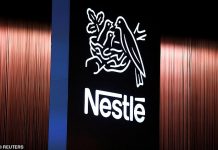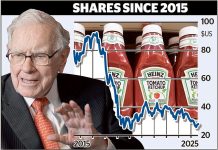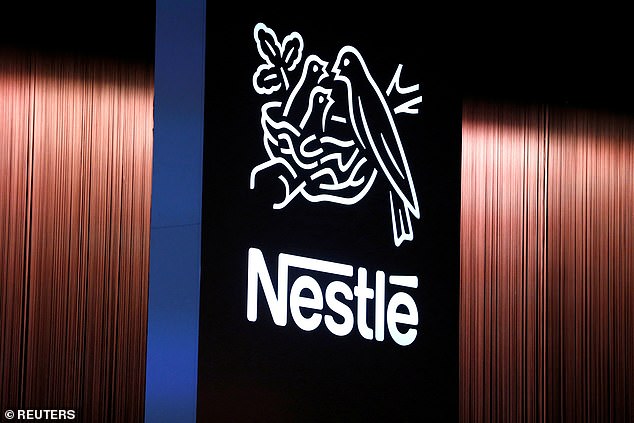Branded consumer goods companies are under siege amid falling or stalling share prices.
There is once again turmoil at Swiss-based Nestle – home to such British treats as Kit Kat and Quality Street.
Chief executive Laurent Freixe has been ousted without pay over an affair with a colleague at a critical time for the firm as it seeks to recover from a 33 per cent tumble in its share price.
Across the Atlantic, Kraft Heinz is proposing to do the splits to release value, to the annoyance of its most significant shareholder Warren Buffett – who never tires of great brands and invests for the very long term.
Unilever can perhaps breathe a sigh of relief that it escaped the clutches of a £115billion debt-fuelled bid from Kraft Heinz (with help from this paper) back in 2017.
Since then, Unilever has been chopping itself up, selling its Flora spreads enterprise, tea interests and is in the process of listing its Magnum-to-Ben & Jerry’s ice cream offshoots.

Problems: Branded consumer goods companies, including Swiss-based Nestle, are under siege amid falling or stalling share prices
Meanwhile, fizzy drink competitors Pepsi and Coca-Cola are confronting change. Ever-active Elliott has bought a 6 per cent stake in Pepsi and wants to see a clearer focus on the core soft drink brands.
Coke has decided its expensive entrance into coffee, when it bought Costa from Whitbread, is a distraction.
All this disassembly of fast-moving consumer goods firms is great for investment banks, which like nothing better than putting together grandiose deals, which rarely work well, and collecting another set of fees.
Over-ambitious executives then struggle with sprawling empires, which no longer make sense.
In prosperous G7 economies consumers always want something better and demand for Costa coffee is being displaced with craft brands, with beans harvested in exotic locations. There is nothing new under the sun.
The latest series of deals is a strong reminder of the break-up of the conglomerates in the mid-1980s and 1990s.
Most famous of the deals was the bitterly fought KKR private equity battle for RJR Nabisco in 1988, which eventually saw tobacco brands separated from food.
In the UK, Lord Hanson’s triumphal takeover of Imperial Brands also paved the way for the separation of smokes from chickens.
British American Tobacco having diversified into insurance (Eagle Star and Zurich) and department stores broke itself up after an unsuccessful boarding party from Lord (Jacob) Rothschild, Sir James Goldsmith et al.
Previously, the break-ups were driven by the magic of leverage. Cheap debt was used to take out quoted firms, which could be split into the component parts and sold back to public markets and returned to public shareholders at big profits.
Elliott and Berkshire Hathaway come at these issues with different agendas. Elliott, with the exception of Waterstones, is in for the quick kill.
Buffett, and one assumes his successor, are collectors of brands. They know that great products such as Coke will always have a market, even if it is India and not the aisles of Lidl.
Changing the proprietors may release short-term value, but brilliant historic brands should be forever.
French lessons
Not surprisingly much of the focus in the bonds market has been on gilts. Labour promised to make Britain the fastest growing economy in the G7.
Instead, it has the highest bond yields among the world’s richest nations.
That doesn’t necessarily mean that the UK economy is the only one facing a blow up. France are in deep doo-doo.
Unless there is a political and fiscal awakening, France’s debt load is on track to be higher than Greece and more than twice the whole output of Ireland by 2030.
Small wonder investors are piling into gold with analysts predicting it hitting $4,000 an ounce by next year. Time to melt down all that forgotten jewellery.
Predators ball
Financialisaton of sport is proving disruptive enough with ten premier league clubs in the hands of American moguls.
Now aggressive investors at Apollo, once the home of discredited investor Leon Black, are preparing a $5billion (£3.8billion) fund focusing on stakes in sports teams and franchises. Beware.
DIY INVESTING PLATFORMS

AJ Bell

AJ Bell
Easy investing and ready-made portfolios

Hargreaves Lansdown

Hargreaves Lansdown
Free fund dealing and investment ideas

interactive investor

interactive investor
Flat-fee investing from £4.99 per month

InvestEngine

InvestEngine
Account and trading fee-free ETF investing
Trading 212
Trading 212
Free share dealing and no account fee
Affiliate links: If you take out a product This is Money may earn a commission. These deals are chosen by our editorial team, as we think they are worth highlighting. This does not affect our editorial independence.
Compare the best investing account for you
#Breaking #hard #Brilliant #historic #brands #ALEX #BRUMMER
















